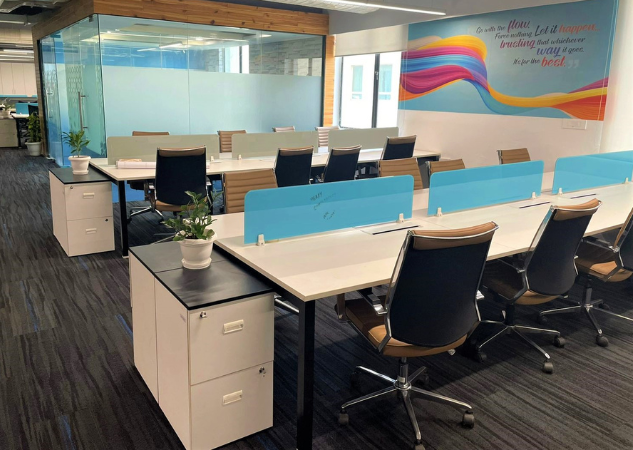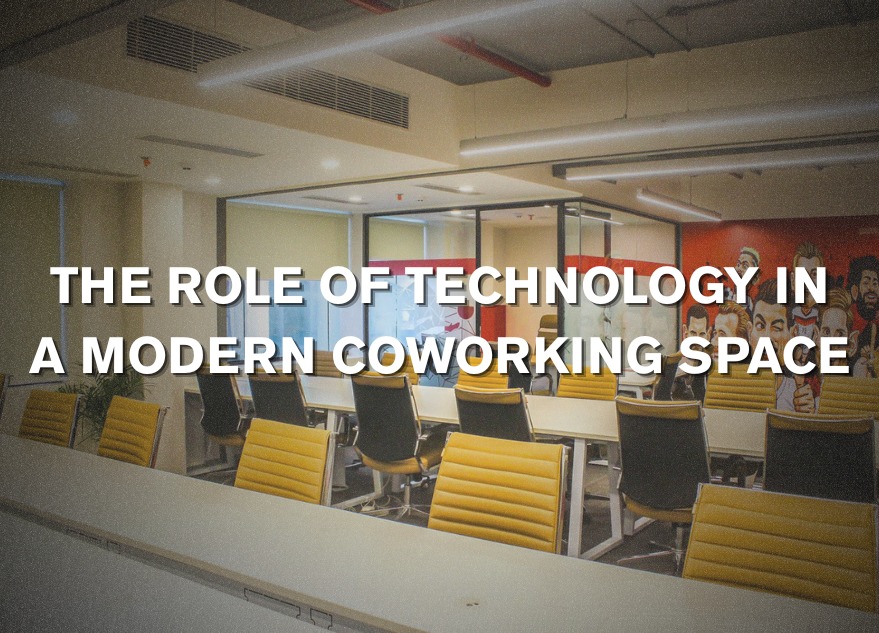Coworking spaces are now essential to the modern work culture, serving freelancers, startups, and large enterprises alike. In this post, discover 12 ways technology powers today’s coworking spaces.
💡 Are you looking for Coworking space in Gurgaon, Noida or Delhi? We are just a call away.
Call Now: 08999 828282
12 Key Points that Highlighting the Role of Technology in a Modern Coworking Space
- High-Speed Internet
- Cloud Services
- Communication Tools
- Access Control Systems
- Booking and Management Software
- Smart Office Equipment
- IoT and Smart Devices
- Virtual Receptionists and AI Assistants
- Security Systems
- Community Platforms
- Health and Wellness Technology
- Tech-Savvy Event Spaces

1. High-Speed Internet
Reliable, high-speed internet is the backbone of any coworking space. It supports all digital activities, from simple email exchanges to video conferencing and large data transfers. Without robust internet connectivity, productivity would suffer significantly. Modern coworking spaces invest in high-bandwidth internet connections with redundancy to ensure uninterrupted service.
2. Cloud Services
Cloud storage and computing services enable members to access their work from anywhere, collaborate in real-time, and ensure their data is secure and backed up. This flexibility is essential for remote work and collaboration with global teams. Services like Google Workspace, Dropbox, and Microsoft Azure provide scalable solutions that cater to diverse business needs.
3. Communication Tools
Platforms like Slack, Microsoft Teams, and Zoom facilitate seamless communication and collaboration among members, whether they are in the same space or working remotely. These tools integrate messaging, video calls, and file sharing, making it easier to manage projects and communicate effectively. They also support integration with other productivity tools, enhancing workflow efficiency.
4. Access Control Systems
Smart access systems using RFID cards or mobile apps provide secure, easy entry to the coworking space, ensuring only authorized individuals can access the premises. These systems can be programmed to grant access at specific times, enhancing security while offering convenience. Additionally, they can track entry and exit times, providing valuable data for space management.
Also Read: 10 Things You Didn’t Know About Coworking
5. Booking and Management Software
Sophisticated software solutions allow members to book desks, meeting rooms, and other amenities online, optimizing space utilization and minimizing conflicts. These platforms often include features for billing and resource allocation, streamlining administrative tasks. Users can see availability in real time and make reservations from their devices, ensuring efficient use of resources.
6. Smart Office Equipment
Modern coworking spaces are equipped with smart printers, scanners, and other office equipment that can be accessed and managed via mobile apps or online platforms. These devices often come with features like remote printing, maintenance alerts, and usage tracking, reducing downtime and improving user experience. Integration with cloud services also allows for seamless document management and sharing.
7. IoT and Smart Devices
Internet of Things (IoT) devices enhance the working environment by enabling smart lighting, climate control, and energy management, creating a comfortable and efficient workspace. These devices can adjust settings based on occupancy and user preferences, leading to energy savings and increased comfort. For example, smart thermostats and lighting systems can automatically adjust to optimal levels, enhancing productivity and reducing operational costs.
8. Virtual Receptionists and AI Assistants
AI-powered virtual receptionists can handle inquiries, schedule meetings, and provide information to visitors, freeing up human staff for more complex tasks. These systems can interact via voice or text, providing immediate assistance and improving efficiency. They can also manage routine tasks like visitor check-ins and appointment reminders, ensuring smooth operations.
9. Security Systems
Advanced security systems, including CCTV, biometric access, and intrusion detection, ensure the safety and security of the workspace and its members’ belongings. These systems provide real-time monitoring and alerts, enabling quick responses to potential threats. Biometric systems, such as fingerprint or facial recognition, offer high security and convenience for accessing restricted areas.
10. Community Platforms
Dedicated platforms and apps foster a sense of community by enabling members to connect, share resources, collaborate on projects, and participate in events and activities. These platforms often include social networking features, event calendars, and discussion forums, promoting interaction and collaboration. They help build a vibrant community, enhancing member satisfaction and retention.
💡 SMBs looking for HR, Marketing, Technology and Funding solutions for their business.
Call Hello Jarvis 994 8000 800
11. Health and Wellness Technology
Innovations such as air quality monitors, ergonomic furniture, and wellness apps promote a healthy and productive work environment. Air quality monitors ensure a safe atmosphere, while ergonomic furniture reduces physical strain. Wellness apps can offer guided meditation, exercise routines, and health tracking, supporting overall well-being.
12. Tech-Savvy Event Spaces
Equipped with the latest AV technology, coworking spaces can host webinars, workshops, and networking events, adding value to the community and fostering professional growth. High-quality audio-visual equipment, video conferencing capabilities, and interactive displays make these events engaging and accessible to a wider audience, both in-person and online.
To conclude, incorporating these technological advancements transforms coworking spaces into dynamic, efficient, and attractive environments for today’s diverse workforce. As technology continues to evolve, so too will the capabilities and offerings of modern coworking spaces like The Office Pass (TOP) co-working spaces available in Delhi and NCR can help you protect your data and customers. TOP offers all the modern-day facilities ensuring they remain at the forefront of the future of work. Contact us for more details at 08999 828282.
FREQUENTLY ASKED QUESTIONS (FAQS):
Question: How does technology enhance productivity in a coworking space?
Answer: Technology enhances productivity by providing high-speed internet, collaboration tools, and project management software. These technologies facilitate seamless communication, efficient task management, and quick access to information, allowing users to focus on their core tasks without technical interruptions.
Question: What types of technology are typically found in modern coworking spaces?
Answer: Modern coworking spaces typically feature high-speed Wi-Fi, cloud storage, collaboration tools (like Slack and Trello), video conferencing equipment, smart meeting rooms, access control systems, and advanced printing solutions.
Question: How does high-speed internet impact coworking spaces?
Answer: High-speed internet is crucial for ensuring that all members can work efficiently without delays. It supports video conferencing, large file transfers, cloud-based applications, and other bandwidth-intensive tasks, making it a fundamental requirement for a productive coworking environment.
Question: What role do collaboration tools play in coworking spaces?
Answer: Collaboration tools such as Slack, Microsoft Teams, and Asana facilitate communication and project management among coworking members. They help streamline workflows, enable real-time collaboration, and keep team members connected, regardless of their physical location within the space.
Question: How do smart meeting rooms benefit coworking space users?
Answer: Smart meeting rooms are equipped with advanced technology like interactive whiteboards, video conferencing systems, and scheduling software. These features enable seamless meetings, remote collaborations, and efficient use of meeting spaces, enhancing overall productivity and user experience.
Question: What is the importance of security technology in coworking spaces?
Answer: Security technology, including access control systems, surveillance cameras, and secure Wi-Fi networks, is vital in coworking spaces to protect sensitive data and ensure the safety of members. It helps prevent unauthorized access and maintains a secure environment for all users.
Question: How do coworking spaces utilize IoT (Internet of Things) technology?
Answer: IoT technology in coworking spaces can include smart lighting, climate control systems, and occupancy sensors. These technologies enhance the comfort and efficiency of the workspace by optimizing resource use and creating a more personalized working environment.
Question: Can coworking spaces support remote work with their technology?
Answer: Yes, coworking spaces are well-equipped to support remote work with high-speed internet, VPN access, video conferencing tools, and cloud-based applications. These technologies enable remote workers to stay connected and productive from anywhere within the coworking space.
Question: How do coworking spaces use technology to foster community and networking?
Answer: Coworking spaces use technology like social networking platforms, member directories, and event management software to foster a sense of community. These tools help members connect, collaborate on projects, and participate in events, enhancing the overall coworking experience.
Question: What future technologies could further enhance coworking spaces?
Answer: Future technologies like AI-driven analytics, virtual reality (VR) meeting spaces, augmented reality (AR) tools for collaboration, and more advanced IoT devices could further enhance coworking spaces. These innovations could offer more personalized experiences, improved productivity, and new ways of interacting and collaborating.



